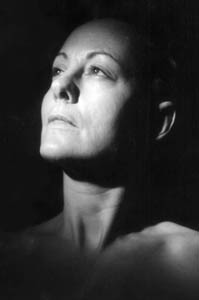![[Metroactive Stage]](/stage/gifs/stage468.gif)
[ Stage Index | San Jose | Metroactive Central | Archives ]
 Have Wit: Dr. Vivian Bearing, Ph.D. (Julia Brothers), stoically but often humorously narrates her eight months of cancer treatment.
Have Wit: Dr. Vivian Bearing, Ph.D. (Julia Brothers), stoically but often humorously narrates her eight months of cancer treatment.
Soul of 'W;t' Margaret Edson's play looks deeply at life and death By Heather Zimmerman IN MOST LITERARY and dramatic works, disease is a device that ends a life; in Margaret Edson's W;t, a terminal illness becomes the means for exploring life. Edson's rich drama addresses issues of life and death on many levels, and with this production, the San Jose Stage Company has done a tremendous job of getting at the soul of W;t. A professor and expert on the works of 17th-century metaphysical poet John Donne, Vivian Bearing, PhD (Julia Brothers) has devoted her life to academia. Upon learning that she has advanced ovarian cancer, she signs her life over to a different field of study, agreeing to undergo eight months of experimental chemotherapy that could contribute significantly to cancer research. As a literary scholar, Vivian can delve into the meaning of every word, in anything from a text to a simple conversation, but as her treatment progresses, she finds herself unable to analyze the meaning of her own life. Brothers conveys Vivian's physical and emotional pain with both stubborn snap and a grudging vulnerability. Director Kenneth Kelleher makes sure we hang on her every word, keeping her close to the audience when she speaks to us; the effect is almost confrontational. Vivian has no friends or family to visit her; her sole human interactions are with the nurses and doctors who tend to and study her, a large, dauntingly anonymous group that Kelleher parades through Vivian's hospital room with dispassionate efficiency. Here, Edson gets in some harsh criticism for those members of the medical community who fail to recognize the humanity of their patients. Chief among them is Jason Posner, M.D., played with a perfect impersonal detachment by Neil Howard. Unique in this clinical environment is Susie Monahan (Casey Jones Bastiaans), one of Vivian's regular nurses, whose easy-going ways and warm personality increasingly comfort Vivian, despite her attempts at stoicism. Vivian herself has always been a detached researcher, and although she has a tremendous passion for studying and interpreting Donne's poems, we see that she has treated the art purely as science. She capably analyzes the emotions Donne expresses in the poems but never seems to have felt them. Throughout the play, Vivian speaks to the audience, in monologues and asides. Bald from chemo and garbed in a hospital gown, she leads us through her eight months of treatment with what she seems to hope is unemotional assessment and plain, often witty distaste for the high tragedy of most tales of terminal illness. It's through these encounters with the audience that W;t offers many of its insights, as Vivian realizes a lifetime of scholarship hasn't brought her the understanding of life she believed it would, saying, "I always thought being smart would take care of it." Of course, it would be no smarter to expect to find the meaning of life explained in the themes of W;t than in Donne's poetry, but perhaps that's why the play is so affecting. Edson offers no cautionary morals, and no carpe diem speeches. At its most basic, W;t is a slice of life--and death--and doesn't pretend to offer meaning beyond the human experience it portrays. Edson demonstrates that literature is no more merely words than humans are simply the sum of their body parts; what makes a poem worth reading or a life worth saving is its humanity.
W;t plays Wednesday-Saturday at 8pm, Sunday at 2pm through Feb. 18 at the Stage, 490 S. First St., San Jose. Tickets are $16-$30. (408.283.7142) [ San Jose | Metroactive Central | Archives ]
|
From the February 1-7, 2001 issue of Metro, Silicon Valley's Weekly Newspaper.
Copyright © 2000 Metro Publishing Inc. Metroactive is affiliated with the Boulevards Network.
For more information about the San Jose/Silicon Valley area, visit sanjose.com.